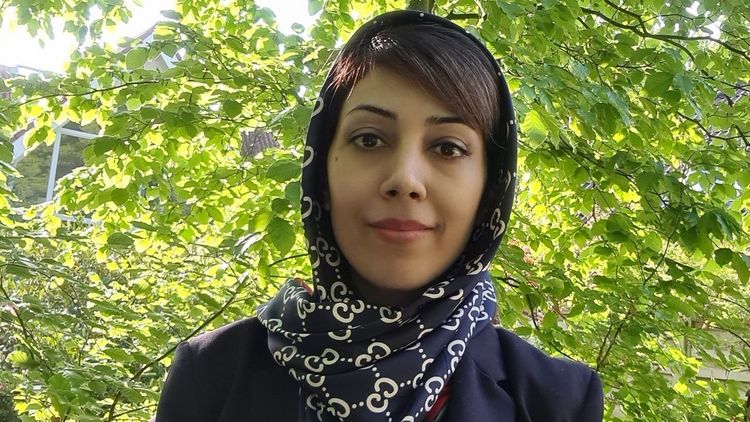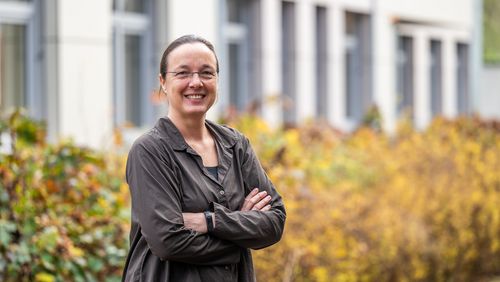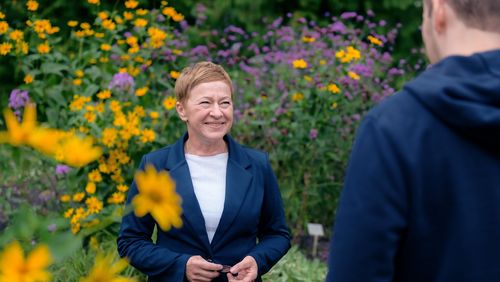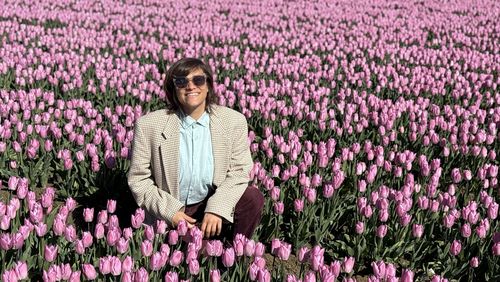From research on water splitting to riding bikes: Thanks to a Humboldt Research Fellowship, the chemist Mandana Amiri is currently working at the university’s Institute of Chemistry – and also enjoying a typical Oldenburg lifestyle.
Moving an entire family from Iran to Germany seems to be a routine task for Prof. Dr Mandana Amiri. The 42-year old chemist is currently a visiting researcher at the University of Oldenburg – and has come with her family to Germany for a research stay already for the second time. She thinks of herself as an international scientist: “I’ve been collaborating with researchers from several countries for some time and I’m always curious to learn new things,” she says.
Thanks to a Georg Forster Research Fellowship granted by the Humboldt Foundation, Amiri is currently working at the university’s Institute of Chemistry far away from her home institution, the University of Mohaghegh Ardabili in the northwest of Iran. Her children, twin boys, and her husband, also a chemist, are sharing her new life in Oldenburg.
Amiri is conducting research on what experts call electrochemical energy conversion. “The university has several high-tech facilities and strong scientists working in my field,” she explains. Back in 2016, she came here supported by a scholarship funded by the German Academic Exchange Service (DAAD) to work in the research group Physical Chemistry led by Prof. Dr Gunther Wittstock.
An environmentally friendly way to generate hydrogen
Since then, she had been cooperating remotely also with Prof. Dr Michael Wark, head of the research group Technical Chemistry. “But now it was time to collaborate face-to-face,” Amiri tells and adds: “I am more than happy about the prestigious Humboldt Fellowship for experienced researchers, as it allows me to broaden my expertise and research network.” Her husband, Prof. Dr Abolfazl Bezaatpour, also continues working on his projects while staying in Oldenburg.
Amiri’s research addresses a highly relevant topic: She focuses on electrochemical ways to produce hydrogen from water. “Splitting water into oxygen and hydrogen gas during electrolysis is an environmentally friendly alternative to generate hydrogen,” she explains. “At present, hydrogen is mainly produced from fossil resources through a steam reforming process, which accelerates fossil fuel depletion and CO2 emissions.”
Designing and modifying catalysts
Specifically, Amiri and her colleagues are working with so called non-noble metal oxide-based water oxidation catalysts. These molecules are used to aid the water-splitting process and to make it more energy-efficient. “We are going to design and synthesize some metal-organic frameworks (MOFs) as electrocatalysts,” she tells. The ultimate aim is to have molecules at hand that make water-splitting feasible in a cost-efficient manner.
Cooperating with Wark’s research group comes in naturally, Amiri tells: “His group works on photocatalytic and photoelectrochemical water-splitting with various catalysts.” As the scientists in Oldenburg also have broad experience in designing and modifying such catalysts, the guest from Iran and the Oldenburg researchers can learn from each other.
Welcoming atmosphere for internationals
But it is not only the research environment that has attracted Amiri to Oldenburg: “The university has a beautiful campus and a warm, welcoming atmosphere for internationals,” she says. The chemist loves that the city and its surroundings are green and calm. She also enjoys riding the bike and taking her family out to trips to the flat countryside– something which is not possible in the mountainous surroundings of her home town Ardabil.
When imagining Germany, Amiri tells, she thinks of discipline, rules, hard-work, international atmosphere and beautiful nature. And although she generally perceives German people as helpful and friendly, she sometimes finds it hard to get the conservation going – maybe also because of the social distancing paradigm that has been dominant throughout the current pandemic. “Germans usually prefer you to start talking,” she says with a smile. But things tend to become easier, she holds, once the conversation is underway.
Coming to Germany during this year’s lockdown hasn’t been easy, particularly for the kids, the chemist says. In the meantime, things have improved: “I'm particularly grateful for having good friends such as my colleagues, my students and the landlord families who support me in all aspects in Oldenburg,” she says. The boys, going to a small local primary school, have also settled in well in Oldenburg. “They find it easy to make friends,” Amiri notes. In this way, the children too are already on their way to becoming true internationals.




